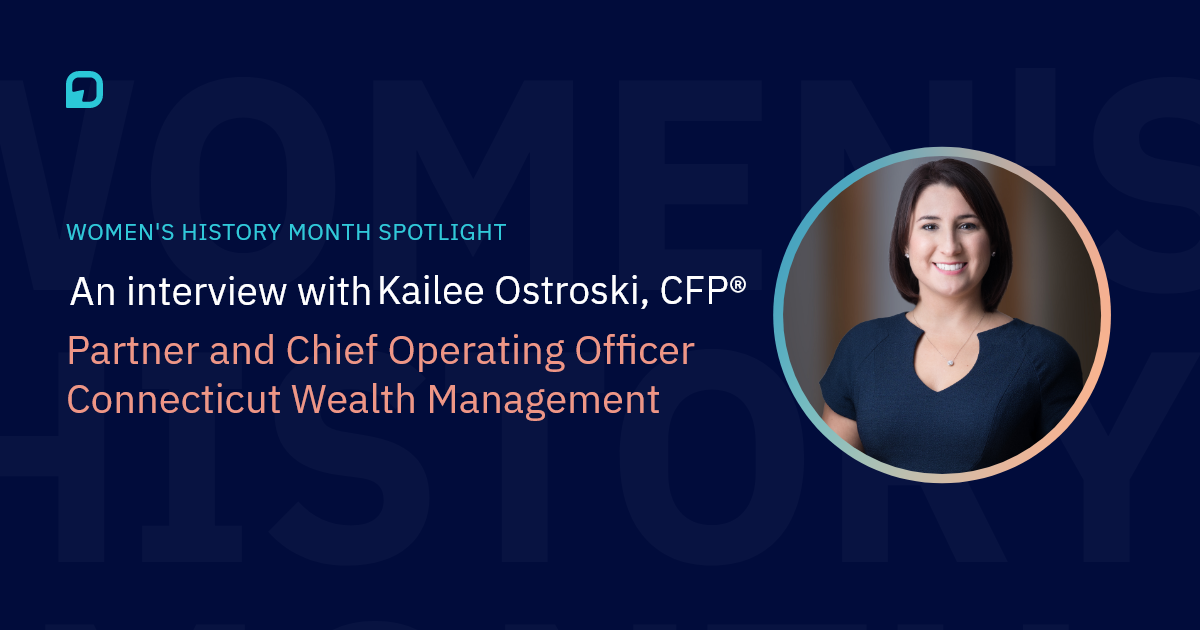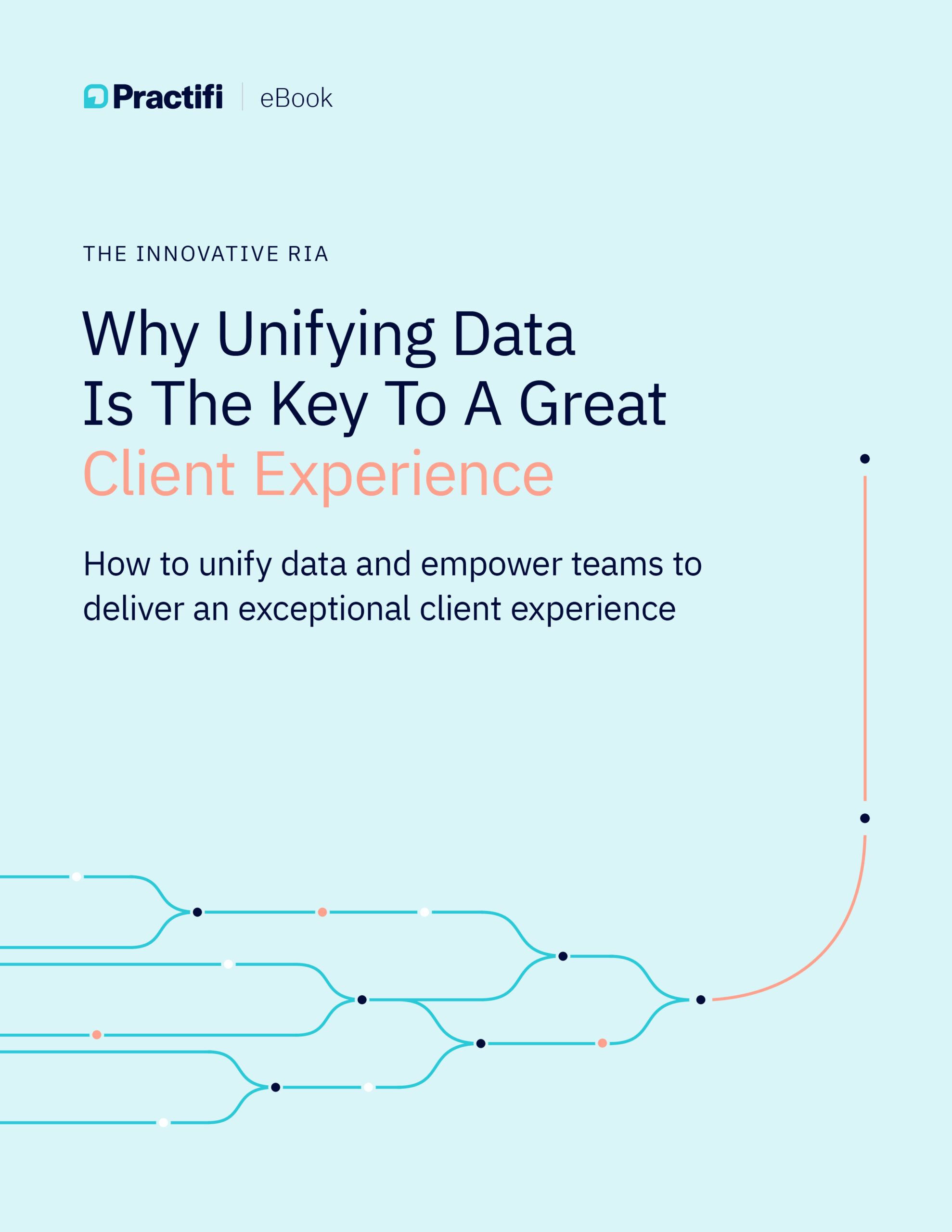
Women’s History Month Spotlight with Kailee Ostroski, CFP®

BY Team Practifi
In celebration of Women’s History Month, we want to shine a spotlight on the incredible contributions and journeys of women within and outside of Practifi. In this special series, we are honored to feature five remarkable women leaders who have forged their own paths within the wealth management and finance space. Through their stories and insights, we aim to not only celebrate their achievements but also gain valuable perspectives from their experiences navigating and excelling in a traditionally male-dominated industry.
Meet Kailee Ostroski, CFP®, a versatile professional whose career illustrates adaptability and growth amidst transitions across diverse sectors. From her roots in education to her flourishing role in finance, Kailee’s story embodies the transformative power of seizing new opportunities and embracing change. In this interview, Kailee invites us along her journey, offering candid reflections on the challenges faced and lessons learned along the way.
From Educator to Executive
Kailee’s journey into the financial services realm defies traditional career narratives, yet it resonates with a profound sense of purpose and fulfillment. Transitioning from the classroom to the boardroom, she discovered a new avenue for her innate skills and passion for making a difference.
Q: Can you tell us about your journey into the finance industry and how it began?
A: My journey into this space may not be particularly inspirational in the grand scheme of things, but it has been a rewarding experience for me personally. I began my career as a high school social studies teacher and taught for five years. Around the four to five-year mark, I realized that teaching wasn’t bringing me the joy I desired in my career and personal life. It was at this point that a fortuitous connection was made between one of my colleagues and one of the founders of Connecticut Wealth Management. CTWM was seeking an entry-level financial advisor and thought a teacher’s skills — patience, the ability to explain concepts, and attention to detail — would be a great fit. Despite my initial lack of knowledge about finance, they saw potential in me and offered me the opportunity to join the firm.
While my entry into the financial services industry wasn’t driven by a passion for finance itself, I was drawn to the opportunity to continue helping and educating people, albeit in a different context. Transitioning from educating students to educating clients and eventually supporting my team in serving clients allowed me to maintain a people-first approach throughout my career trajectory.
Currently, I am the COO of Connecticut Wealth Management. My primary responsibility is to ensure that our organization consistently embodies our core values and mission statement while advancing our goals for the firm. This involves setting both short and long-term goals for individuals, departments, and the organization as a whole. While some aspects of my role involve exciting strategic planning and vision-setting, others are more focused on things like ensuring the firm’s cybersecurity and compliance measures are top-notch. Balancing these different types of activities is a key part of my day-to-day responsibilities.
Navigating Transistions and Embracing Support
Kailee’s journey from the classroom to the finance sector was smoother than expected, thanks to the unwavering support of her new organization. Reflecting on her transition, she couldn’t help but notice the differences in gender dynamics between education and finance. Despite this, her firm’s inclusive culture has shielded her from many gender-related challenges that women in finance face. However, she remains mindful of the broader biases in the industry, fueling her commitment to fostering inclusivity wherever she goes. Kailee’s experiences offer valuable insights into navigating career shifts and advocating for supportive workplaces in diverse industries.
Q: Reflecting on your career, what were some challenges you faced and how did you navigate them?
A: Ultimately, I’d say I’m a planner, and like many in this industry, planning is second nature to me. Surprisingly, the transition from teaching to finance was easier in practice than I anticipated. While I was initially terrified to make the change, having only known the education system like so many students-turned-teachers, I found tremendous support in my new organization. They were dedicated to developing and educating me from the ground up, even on basic tools like Microsoft Outlook. The culture they fostered made all the difference.
What struck me as a female in this space was the contrast with the education sector, which is typically female-dominated. Gender differences weren’t a defining aspect there. However, in finance, this dichotomy was more noticeable. Fortunately, my firm has been incredibly supportive, and I’ve never felt challenged because of my gender. However, I’m aware that gender bias is a challenge in the industry for many, which drives me to ensure a culture of inclusivity wherever I work.
Q: As a woman who transistioned from teaching to the financial services industry, were there any stereotypes or preconceived notions you encountered about women in a male-dominated industry?
A: Absolutely, it’s fascinating to explore the preconceived notions and stereotypes that may deter women from pursuing careers in certain industries. Whether these notions are legitimate or not, they can significantly influence perceptions and decisions. Transitioning from teaching to the financial services industry was indeed a significant shift for me, but surprisingly, some aspects could be blended in a meaningful way. While the two fields may seem vastly different on the surface, there are underlying skills and values, such as communication, patience, and a focus on helping others, that can be applied in both contexts.
Advocating for Inclusion: A Perspective on Gender Representation
Kailee’s perspective on gender representation in leadership roles offers a nuanced understanding of the complexities within the industry. Recognizing the delicate balance between addressing systemic issues and perpetuating stereotypes, she emphasizes the importance of merit-based decision-making regardless of gender. Drawing from her experiences, Kailee sheds light on the challenges faced by talented women striving for higher positions and underscores the necessity of fostering awareness and commitment to inclusivity.
Q: At a leadership level, what are your thoughts on the current level of representation of women in leadership roles in the industry?
A: Navigating questions and situations like these can indeed be challenging. On one hand, there’s the concern of perpetuating the narrative of a male-dominated industry by discussing it. Yet, on the other hand, calling out these issues is often necessary to drive positive change. Personally, I firmly believe that someone’s gender should never dictate their abilities or opportunities. Merit should always be the primary consideration for leadership positions.
Throughout my life, I’ve witnessed numerous talented women who deserve higher positions but face obstacles in reaching them. It’s a complex issue, and while I may not have all the answers, I believe that fostering awareness, thoughtfulness and a commitment to merit-based decision-making are crucial steps toward creating a more inclusive and equitable industry.
Q: Do you feel companies have an obligation to promote and support women to take leadership roles?
A: Absolutely, there’s a significant responsibility to advocate for inclusivity, especially in industries facing preconceived notions and challenges. This advocacy extends to recruitment efforts, where organizations must actively communicate their commitment to diversity and inclusivity.
Regarding training and support, different companies may adopt varying approaches, ranging from a more entrepreneurial, self-driven model to a more supportive and structured one. Organizations need to be transparent about their culture and expectations from the outset, ensuring alignment between the company’s approach and the individual’s preferences and career goals.
Also, proactive engagement with individuals interested in the industry, starting from high school and college levels, is crucial for shaping a culture of inclusivity and diversity. By building relationships with local schools and colleges, offering shadowing opportunities, and showcasing the organization’s values and culture, you’re not only attracting talent but also fostering a mindset of inclusivity early on. This approach not only benefits the up-and-coming workforce by providing them with insight and awareness but also prompts organizations to reflect on and actively address questions about their diversity and inclusion practices. As the community increasingly emphasizes these aspects, organizations are compelled to prioritize and proactively address diversity and inclusion concerns.
Q: What advice would you give to young women aspiring to enter the wealth managment tech sector?
A: Finding fulfillment in your work is essential, especially considering the significant amount of time we spend on the job. It’s a deeply personal journey, and what fulfills one person may not necessarily fulfill another. For me, transitioning into a role that aligned with my passions and provided a sense of fulfillment was transformative. It not only enhanced my professional life but also positively impacted my personal life, making me a better individual, wife, and mother. I believe this holds true for many people — when you’re engaged in work that you love, it can have a ripple effect, improving various aspects of your life. While change can be intimidating, especially for those new to their careers or for women navigating uncertain opportunities, it’s crucial not to settle and always strive for fulfillment.









